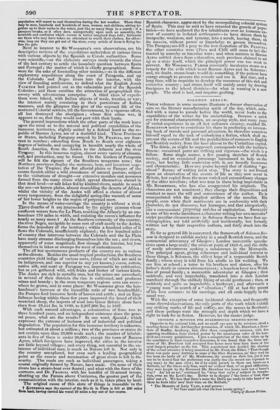SOLOMON SEESAW.
THESE volumes in some measure illustrate a former observation of ours on the literary manufacturing spirit of the day, which, satis- fled with a name to parade betbre the world, never looks to the capabilities of the writer for his undertaking. Because a quick eye for external characteristics, an on-going style, and many years of varied experience in an all but unknown country, enabled Mr. ROBERTSON senior to contribute his share in producing an interest- ing book of travels and personal adventure, he therefore conceives himself' equal to the task of embodying a fiction, which shall re- present the events of life and the peculiarities of manners in English and Scottish society, from the base almost to the Corinthian capital.
The fabric, as might be supposed, corresponds with the builder's
fitness : occasional parts are striking and vigorous—the whole is a failure. Some single scenes, a few passing sketches of Scotch society, and an occasional personage introduced to help on the story, but having little connexion with it, are broadly humorous and characteristic. Here any praise beyond that of dashing " go- ahead " fluency of writing must stop. The story is not formed upon an observation of the events of life as they now occur in Britain, but copied from the more varied and extraordinary changes of the older novelists ; what was true in them being improbable in Mr. ROBERTSON, who has also exaggerated his originals. The characters are not consistent ; they change their dispositions and conduct to meet the will and convenience of the author. He is unacquainted with the simplest artifices of the novelist. His people, even when their sentiments arc in conformity with their character, do not discourse, but harangue, and that categorically, like' it ememiamiami proposing articles of capitulation. SmoLtrar in one of his works introduces a character writing her own memoirs* under peculiar circumstances : in Solomon Seesaw we have four au- tobiographies, not told artificially and incidentally, but formally written out by their respective authors, and fairly stuck into the story. So far as general life is concerned, the framework of Solomon See- saw is designed to exhibit society in a small Scottish town, and the commercial aristocracy of Glasgow ; London mercantile specula- tions upon a large scale;' the crisis or panic of 1825-6, and the shifts of needy adventurers seeking a subsistence in the Metropolis. The principal agent, giving coherence and individual interest to these things, is Solomon, the eldest hope of a respectable Scotch family ; whose story is told from his cradle to his wedding. We see him at school ; a tutor to his brothers and sisters, after his father's death in narrow circumstances ; a hopeless lover to a Welsh lass of proud family ; a mercantile adventurer at Glasgow ; then suddenly, and very improbably, translated into a rich London merchant through the unlikely liking of an old gentleman ; then, as suddenly and quite as improbably, a bankrupt ; and afterwards a "young man" in search of a " situation ; " till at last the parent of his love consents to his marriage, and all ends happily in the usual way.
With the enception of some incidental sketches, and frequently some shrewd observations, the only parts of the work which exhibit any striking marks of life and reality, are the scenes in Scotland ; and these perhaps want the strength and depth which we have a right to look for in fiction. However, let the reader judge.
CHOOSING A MINISTER FOR DULLBOROUG MEETINU..110ESE.
Opposite to the national kirk, and no small eye-sore to its minister, stood a
meeting-house of the Antiburgher persuasion, of which Mr. Drawlout, it licen- tiate of Stuffim Academy, had, after three competition sermons, with five opposing candidates, been elected pastor by the unanimous voice of his hun- dred-and-twenty parishioners. Upon a computation of the time taken up by the candidates in their respective discourses, it was found that the three.ser- mons of Mr. Drawlout had occupied four hours more tune than those of the next longest preacher on the list. This ascertained ffict decided the election of the actual minister, it being remarked by Mr. Frost, the Elder, "That though there was gude some doctrine in some o' the ither discourses, an' they wnd na hoe been sae badly MY {VP Mr. Mushroom, the second on their list, yet it was
me to be denied that the preference was justly due (he meant me reproach to ony man) to the man elect ; for if he could preach to them sax hours on a Sabbath, an' the idlers only four, was't no' evident that, wi' as good edification, they were keepit by the Reverend Mr. Drawlout two hours minor out o' harm's way ? An' let us no'," continued he, "deny that we're a' subject to tempta- tion, even on the Lord's day. Better to be sleepin' i' the house o God than out o't. We ken that there's nane the Den's sae ready to take baud o as them he finds idle awa' their time on the Sabbath."
* The Memoirs of Lady VANE, a real person:
" Yet Vane could tell what ills from beauty spring."
Vanity of Homan Wisher.


























 Previous page
Previous page